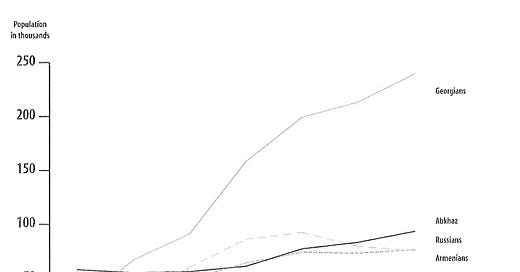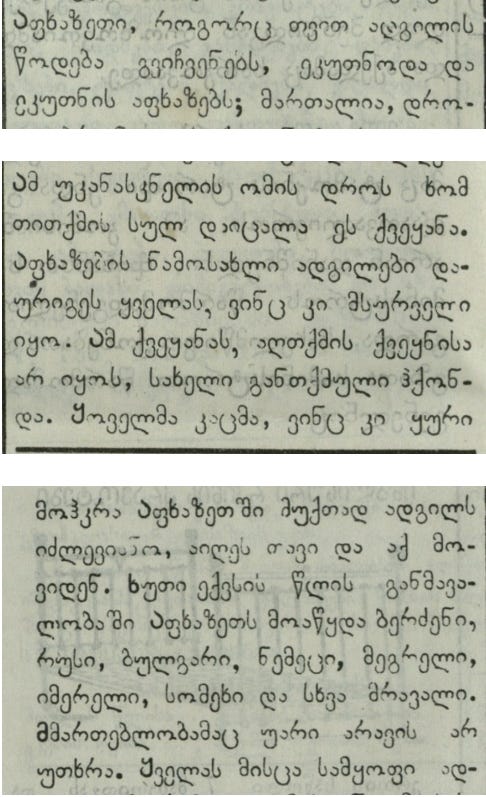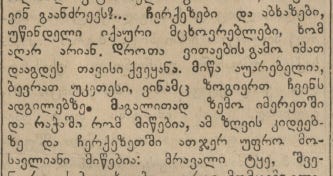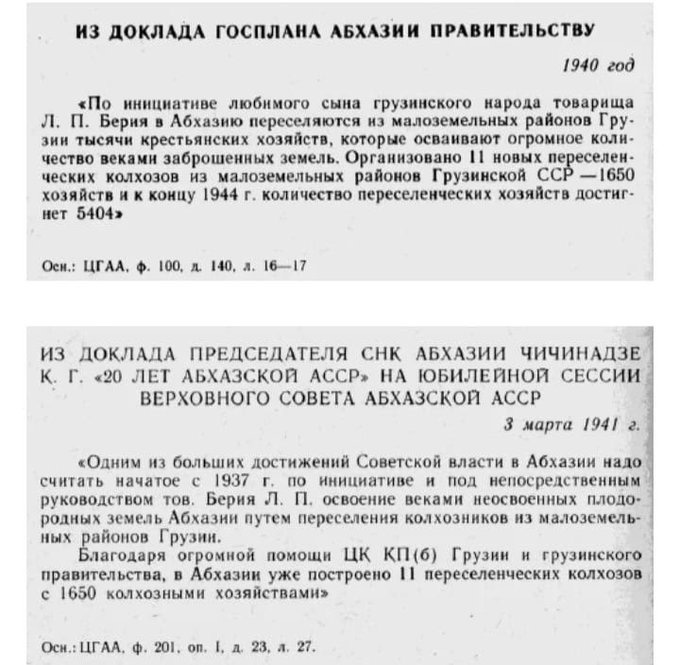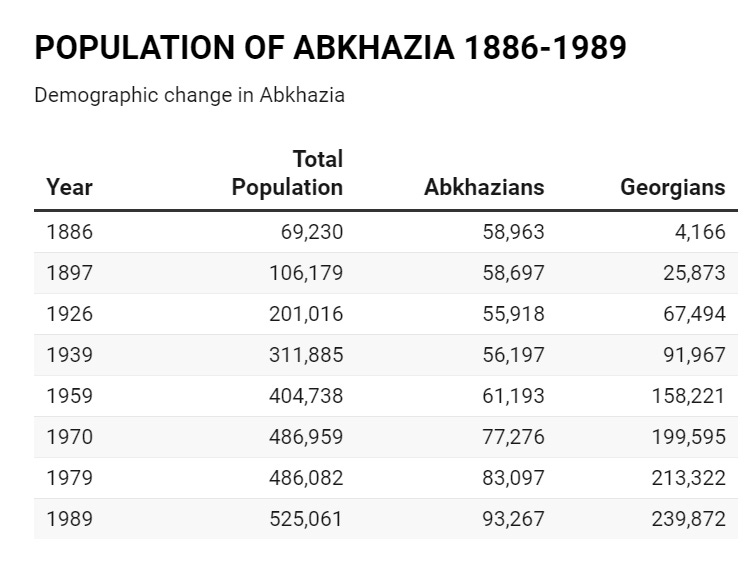After most of Abkhazia’s indigenous Abkhazians were expelled to Ottoman lands firstly at the end of the Russian-Caucasian War (1864) and then following the Russo-Turkish War (1877-78), their vacated lands immediately started to attract colonisation from such diverse incomers as: Mingrelians, Armenians, Greeks, Estonians, Bulgarians, Germans and Modavians — leading Georgian activists at the time (such as the educationalist Iakob Gogebashvili) argued [ /vin unda iknes dasaxlebuli apxazetshi?/ (Who should be settled in Abkhazia?)] that the Abkhazians’ immediate neighbours in Western Georgia’s province of Mingrelia would most easily cope with the prevailing natural conditions, making them the ideal colonisers. However, the initial, rather desultory process of migration was to reach its apogee during the years of the Stalinist-Beriaite repression of the Abkhazians, namely 1937-53. In accordance with a decree of the Communist Party’s Central Committee of 27 May 1939, land was set aside and domiciles specially constructed to house the collective farmers and their families transported into Abkhazia from various regions of Western Georgia (principally Mingrelia).
Population of Abkhazia in 1886: Total 69.230 people.
Abkhazians: 58.963 (85.2%)
Armenians: 1.090 (1.6%)
Georgians: 4.166 (6.0%)
Greeks: 2.149 (3.1%)
Russians: 1.106 (1.6%)
Little Russians: 126 (0.2%)
Estonians: 846 (1.2%)
Germans: 245(0.4%)
Moldovans: 368 (0.5%)
Georgii Tsereteli (1879): 'It’s time that we grab new territories in the Caucasus'
In 1873 the Georgian writer and columnist Georgii Tsereteli wrote:
"Circumstances compelled them [Abkhazians/Circassians] to abandon their country. Land is very abundant and even better than in some of our areas... So, what are our people thinking about? Why hitherto has there been no decision to relocate to this country?... After all, is not the Caucasus our region? The whole Caucasus is our land, our country... Suppose we settle in the country of the Circassians or in Daghestan — everywhere is our motherland." Newspaper “Droeba”, Tiflis, 1873. No 399.
Translation:
'... Abkhazia , as the very name of the place suggests, belonged and belongs to the Abkhazians ... In this last war [1877-1878 -- Ed.], this country was almost completely emptied. The vacated lands of the Abkhazians were distributed among all who desired them. This country, as a country of the covenant, had a famous name. Everyone who had vaguely heard that in Abkhazia land was being divided and given away upped and moved here . Within 5-6 years Greeks, Russians, Bulgarians, Germans, Mingrelians, Imeretians, Armenians, etc. flooded into Abkhazia. And the authorities refused no-one.'
Translation:
"The Circassians and Abkhazians, the former inhabitants there, are, as you know, no longer [there]. They abandoned their country as a result of the state of the times. The land is immeasurable and far better than some of our places. Take for example the soils in Upper Immereti(a) and Rach’a, the soils on the fringes of this sea [sc. the Black Sea] and in Circassia are 10-times more productive in terms of yield:…" Newspaper “Droeba”, Tiflis, 1873. № 399, p.3 The article: shik'rik'i (Courier).
Translation:
"And so what are our folk doing, having been unable hitherto to conceive of moving in the direction of this country? They talk of their inability to abandon their homeland, their own region! But setting a foot all in one region surely won’t lead to men swarming like flies in the place — after all, sooner or later some of our people are nevertheless going to have to abandon their own rural area, since there will no longer be land there. Again then wouldn’t it be preferable that they set about making preparation rightaway before others seize the coastal territories and while land is still plentiful? Should anyone say of his own region that he finds it difficult to abandon it, isn’t the Caucasus, wherever one may be in it, our region? The entire Caucasus is our territory, our country. In the country of the Caucasus, at whatever remove we may be standing one from another, the thought in our mind should be that our foot in planted on our territory…"
The film-clip (from a 30-minute documentary on Abkhazia shot in 1941) talks of settlements having been created in the Gagra, Gudauta and Ochamchira districts and shows incomers travelling on carts, the building of their homes, and one family actually moving in. The scale of the population-movement can be seen by comparing the census-data for 1939 vs 1959, which demonstrates that the number of Kartvelians (viz. Mingrelians, Georgians, Svans, Laz, but chiefly Mingrelians) resident in tiny Abkhazia shot up by some 66,000, with extremely damaging demographic consequence for the native Abkhazian percentage of the overall population.
Translation:
From a Gosplan [The State Planning Committee] Abkhazia report to the government
1940 On the initiative of Comrade L[avrenty]. P. Beria, beloved son of the Georgian people, thousands of peasant farmers are being resettled from districts in Georgia where land is in short supply to Abkhazia, and are taking possession of vast expanses of land that has been abandoned for centuries. Eleven new kolkhozes have been organised [on the basis of] 1650 households resettled from the overcrowded districts of the Georgian SSR, and by the end of 1944 the number of resettled farming households will reach 5404.From a report entitled “20 Years of the Abkhaz ASSR” by K. G. Chichinadze, chairman of the Council of People’s Commissars of Abkhazia, to a jubilee session of the Abkhaz ASSR Supreme Soviet
3 March 1941 The development begun in 1937 at the initiative of and under the direct leadership of Comrade L.P. Beria of fertile lands in Abkhazia that had lain uncultivated for centuries by means of the resettlement of kolkhoz workers from districts of Georgia where land is in short supply should be regarded as one of the major achievements of Soviet power in Abkhazia. Thanks to the large-scale assistance of the C[entral] C[ommittee] of the C[ommunist] P[arty] (bolsheviks) of Georgia and of the Georgian government, eleven kolkhozes have already been established in Abkhazia encompassing 1650 individual farms.
Further reading:
+ Ethno-demographic history of Abkhazia, 1886 - 1989, by Daniel Müller
+ Three Extracts from the Georgian Newspapers Droeba and Iveria
+ Revelations of forgotten voices
+ The Exodus of Abkhazians During the 19th Century: Resistance, Uprisings, and Exile
+ The solitude of Abkhazia, by Douglas W. Freshfield
+ Documents from the KGB archive in Sukhum. Abkhazia in the Stalin years, by Rachel Clogg
+ The Stalin-Beria Terror in Abkhazia, 1936-1953, by Stephen D. Shenfield

